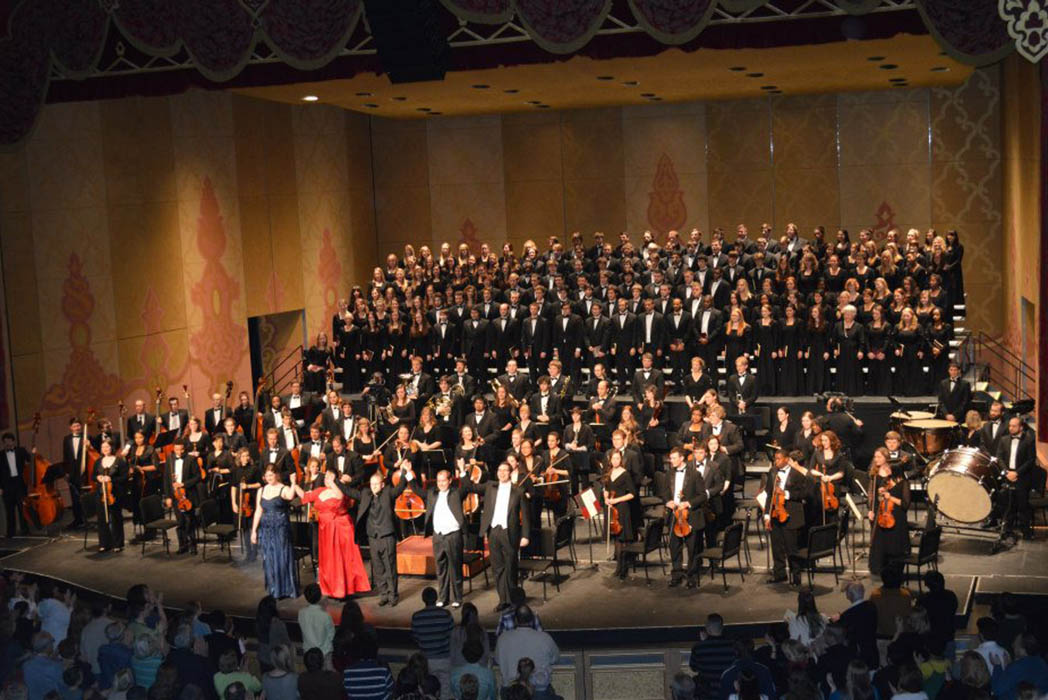BEETHOVEN’S NINTH SYMPHONY
University of Tennessee Symphony Orchestra
University of Tennessee Choral Ensembles
Soloists: Sarah-Clementine Mire, soprano; Sarah Beegle, contralto; Miles Jenkins, tenor; Logan Campbell, bass-baritone
Conductor: James Fellenbaum
Tennessee Theatre, 604 S. Gay Street, Downtown Knoxville
7:30 PM – Sunday evening, February 23, 2020
TICKETS
By the time of the premiere of his Ninth Symphony in Vienna in 1824, Beethoven had been completely deaf for some eight years. During that premiere, it was reported that Beethoven was on stage, turning pages in his score and beating time, while the actual conducting was being done by colleague Michael Umlauf. The popular story has it that Beethoven’s deafness was so complete that he was unaware the orchestra and chorus had concluded and had to be turned around by the contralto soloist, Karoline Unger, to see the audience approval and applause.
Although the work received enormous public acclaim and respect, many critics were dumbfounded and confused by elements of the work’s structure and the addition of vocal and choral music into a symphony. Beethoven supporter Hector Berlioz, speaking as a writer supplementing his earnings from composition by writing music criticism, admitted that exploring and absorbing Beethoven’s Ninth Symphony was a difficult and daunting, if not impossible, task. While some critics “regard it as a monstrous insanity and others can only see in it the fading glimmers of a dying genius,” Berlioz wrote, “… the majority of artistically minded people regard it as an extraordinary conception [and] … assert that this work seems to them the most magnificent expression of Beethoven’s genius.”
Today, few would deny that Beethoven’s Ninth Symphony is one of the most extraordinary masterpieces of Western music even if the reasons for such inspire argument. The “Ode to Joy” theme (poem by Friedrich von Schiller) that the composer suggests throughout, but releases fully in the finale movement, has taken on meaning far outside the work itself. Although that theme has been embraced by democracies and dictatorships alike, the theme is today the anthem of the European Union and used at New Years celebrations around the world.
The University of Tennessee School of Music is offering a performance of Beethoven’s Ninth this Sunday evening at the Tennessee Theatre. Performers include the UT Symphony Orchestra joined by the combined choral ensembles of the School of Music, along with graduate student soloists.
“When the Beethoven Ninth is performed, it’s not just a concert, it is an event,” states James Fellenbaum, director of orchestras at UTKSOM and conductor of the concert. “The scope of the piece, the size, the length—are things that set it apart from other symphonic works. And, there is something more musically and socially impactful about a concert of the Ninth because of Beethoven’s ideal of universal brotherhood.”
That a performance of Beethoven’s Ninth is an event applies not only to its audience, but also to its performers.
“I’ve been proud and impressed with the extraordinary job that the instrumentalists and vocalists have been doing on Beethoven’s extraordinary music,” says Fellenbaum. “There are some passages that are just so hard, and almost downright impossible—the student performers have risen to the challenge of the work’s monumental qualities—length, scale, and tactical difficulty. On top of all those things involving technique, there are musical and thematic elements that are equally important to absorb.”
“There are moments during Beethoven symphonies,” Fellenbaum concludes, “when there is rhythm and melody and harmony—but there is something more, a state of being, a message, a place in your mind that he has expressed through music. Or it’s an ideal he has expressed, like universal brotherhood or how the world could be a better place.”








